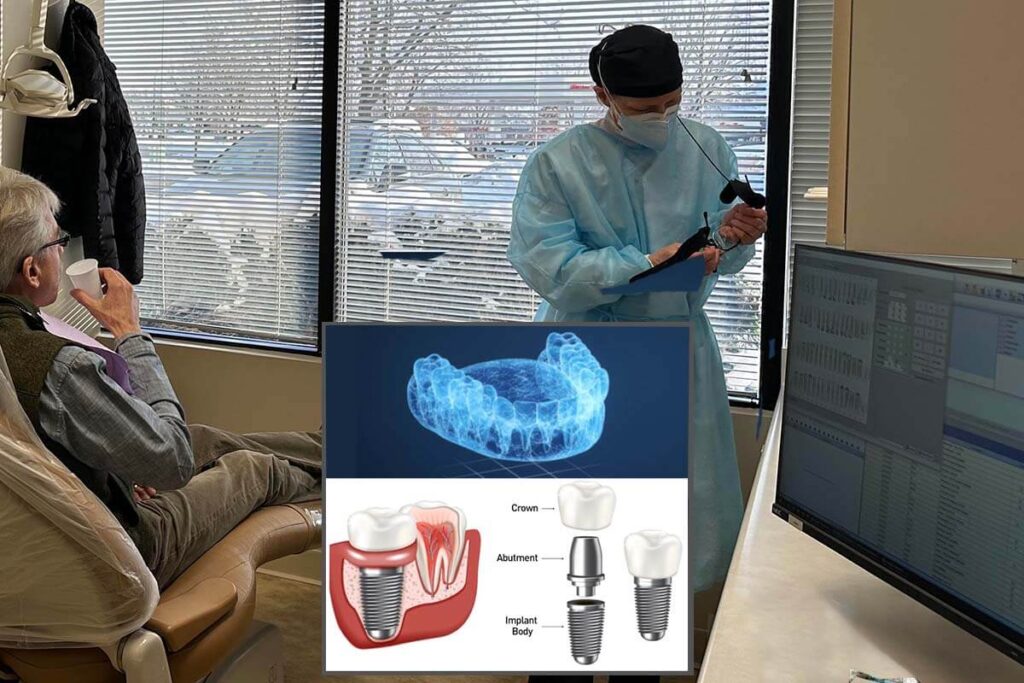Modern Dental Implant Technology
Monday: 7:30am – 5:00pm
Tuesday: 7:30am – 5:00pm
Wednesday: 7:30am – 5:00pm
Thursday: 7:30am – 5:00pm
Friday: Closed

Newer dental implant technology helps patients gain dental implants easier, more comfortably, and with effective results. For a quick recap, dental implants are surgically placed in the patient’s jawbone, where they function as the roots of missing teeth. They provide reinforcement for artificial (fake) teeth, such as crowns, bridges, or dentures.
Dentistry’s technological innovations and scientific research make today’s root-like replacements a safer and more successful procedure. Dental implant specialists can now provide better restorative tooth procedures that produce stunning aesthetic smile makeovers and functional teeth. Modern technology opens up the world of more predictable results.
What is the Latest Technology in Dental Implants?
Five Modern Dental Implant Technologies
- CBCT, 3D Milling and Printing
- Digitally Designed & Milled Implant
- Components and Restorations
- Digital impressions
Computer-guided implant surgery - Intraoral dental cameras
- Robotic arm assistance
CBCT, 3D Milling and Printing
One significant technological advancement in dentistry is 3D milling. 3D or CBCT milling has a significant impact on the dental industry, making the creation of custom dental implants, bridges, and crowns easier. They are tailored to fit the unique shape and size of each individual’s required implant crown.
In 2023, 3D milling technology has further improved. You gain an even more precise and accurate cosmetic restoration. The quickness and precision of 3D milling help shorten the completed restoration time. This means that you spend less time in the dental chair, feel more comfortable, and can enjoy the convenience.
The CBCT scanning tool assists in digitally mapping the positions of your teeth. It can produce a simulated model of the teeth to let the patient see how their smile will look after the implant placement procedure.
3D printing allows the precise fabrication of custom surgical guides and other components to make the surgical process more precise and allow for faster and better healing.
Digitally Designed & Milled Implant Components and Restorations
Immediate-loading dental implant protocols are popular due to their ability to improve the patient’s experience. Digitally designed and digitally milled implant components and restorations typically reduce toothless periods, satisfy esthetic demands, and preserve the patient’s gingival architecture. When it improves patient outcomes, Marc Montgomery DDS may use proven flapless techniques and therapeutic procedures that combine modern techniques into an effective whole implant treatment plan.
By your dentist comparing the digital design and milled implant with the actual post-surgical position of the implant fixture, you gain optimal results. Whether the you have a full-arch dental implants, or a single anterior implant restoration, positioning is important. NIH explains what we look for when using digital designing and milling software.
“No occlusal contact with the opposing teeth, proper proximal contact with the adjacent teeth, marginal adaptation to the customized abutment, and presence of an access hole on the restoration for screw handling.” – Digital implant placement accuracy: a clinical study on a fully-guided flapless single-unit immediate-loading protocol
It also expounds on the benefits of using digitally designed and digitally milled implant components.
“The introduction of intraoral and tabletop scanners has led to the next generation of virtual planning systems. These systems rely on the superimposition of CBCT and scan records, which consider soft tissue morphology in contrast with the conventional dual scan techniques. Moreover, these modern systems decrease clinical sessions and provide more flexibility as the procedure can be modified at any time to comply with different implant systems and designing software.”
Digital Impressions
Computer-Guided Implant Surgery Promotes Quicker Post-Treatment Healing
Computer-guided implant surgery helps a dentist create a 4-dimensional virtual plan that can be transferred to the real-world through guided surgery.
Our more advanced dental implant technology promotes faster healing time frames. Implant patients are having their implants placed and typically begin using them sooner. Newly developed implant materials and techniques, such as immediate load implants, even make the placement of a temporary tooth or teeth possible within the same day as the implant installment.
Patients with excellent oral health are the best candidates for oral implants; as well, we want to minimize unwanted bacteria throughout the procedure. Within recent years, dentists can offer “antibacterial dental implants”. During creation, your custom implants will be coated with a protective gel that consists of silica and antibacterial agents. This not only inhibits bacterial growth, it also promotes osseointegration (bone fusion).
In order to limit the risk of infection, your implantologist must follow the sterilization guidelines for oral surgery scrupulously.
Intraoral Dental Cameras
These cameras are created to assist dentists and are small, hand-operatable devices that make capturing remarkably detailed images of a patient’s teeth and gums possible. In 2023, intraoral cameras are increasingly popular since dentists can now view areas of the mouth that are challenging to see with the human eye.
Digital impressions put patients more at ease than traditional impressions; simply stated, they are more comfortable because they avoid awkward dental trays and impressions. Additionally, their accuracy helps reduce the number of adjustments and remakes. These latest technical implant advancements help you avoid potential dental implant issues.
Robotic Arm Assistance
The use of a dental assist robotic arm has only been introduced recently. During implant surgeries, the use of a robotic arm can help to reduce human errors, especially for newer implantologists. It can aid the process of creating the needed space in the jawbone for placing the implant. This technology offers excellent precision and reduces the chances of improper implant placement.
What is the New Material for Dental Implants?
New or improved materials for oral implants continue to emerge. As early as 2008, Straumann introduced Roxolid, an alloy of titanium and zirconia. Today you may hear about some cases where a trans-sinus approach is used. [1]
During your evaluation appointment, your dentist can answer your questions about what material will be used. A wide range of implants help dentists tailor a plan to different bone situations: tapered, cylindrical, large coils, etc. What material is used may also be influenced by whether or not it is a simple or more complex case.
Dental implant materials should provide:
- Optimal mechanical function.
- Best esthetic appearance.
- Provides biocompatible performance.
- The ability to avoid speech or phonetic issues.
The FDA considers zirconia or zirconium oxide as a good selection for dental implants. Most often manufacturers prefer to rely on titanium, which is perfectly compatible with the alveolar bone and offers an exceptional life span for the implant.
The materials of choice for abutments for final tooth restorations are titanium, gold, zirconium dioxide, and aluminum oxide-based ceramic. Multi-unit abutments may be needed to connect multiple implants. If you have something top of mind or questions, ask ahead of time. Dr. Montgomery will recommend the best material for your unique oral needs.
Recently improved dental implant materials, like zirconia and titanium, offer incredible strength and resilience. They typically last for many years if given proper care of prosthetic teeth. You can enjoy the pleasurable benefits without worrying that your dental implants may become loose or need replacing.
Which ever brand and material of your dental implant, the critical part remains the expertise of the implantologist to whom you entrust your oral procedure. Dental implant placement success requires extensive experience and knowledge. To ensure the success of your dental implant procedure, the implantologist must be meticulous about how the technology is uses.
They must plan the placement of your dental implant with a high level of detail. Long-term success not only requires choosing the right implant for your needs, dentists must also perform the placement perfectly and with exceptional skill. Biocompatibility testing helps ensure that the materials in the dental implant system are safe and do not cause adverse effects (like allergic reactions) when implanted in people.
According to Juneous Pettijohn, “The healing process for the implant body may take several months or longer, during which time you typically have a temporary abutment in place of the tooth.” His October 2021 FDA Dental Implants: What You Should Know article also explains the rigorous process of how new materials must be pre-approved by consensus standards. These standards have details of what makes a safe and acceptable material.
During a dental evaluation about replacing missing teeth with either implant supported dentures or full mouth dental implant prostheses, it’s helpful to be aware of your choices. An implant-supported denture is an oral appliance that replaces multiple teeth, much like a traditional denture.
Are Full-Arch Dental Implants Better Than Implant Supported Dentures?
Implant-supported dentures are a middle-ground option between conventional denture types that use adhesive and the more expensive, advanced full-arch dental implants. They support a denture with two or more dental implants, while full-mouth dental implants use four or more dental implants to support a full arch prosthesis or denture. Full-mouth dental implants are best when you want the closest result to natural teeth. Implant-supported dentures may look and feel less like natural teeth, but still provide sufficient stability to eat, speak, and smile normally.
If you have further questions, contact your dentist without delay to avoid unnecessary pending complications. Learn about possible dental implant costs.
“When a tooth is lost due to injury or disease, a person can experience complications such as rapid bone loss, defective speech, or changes to chewing patterns that result in discomfort. Replacing a lost tooth with a dental implant can significantly improve the patient’s quality of life and health. – FDA [2]
What may Emerge in Future Dental Implant Technology?
Two possible, future dental implant technologies that may be used:
- The Dental Tribune recently talked about how “researchers have developed a new bone regeneration material, derived from plant cellulose, which may be used for dental implants in the future.” [3]
- Stem Cell Dental Implants are a future possibility. Stem cell tooth regeneration is not a mainstream dental treatment at present. Clinical trials for this treatment are still a few years out. [4]
Due to their high demand, dental implant clinical trials are ongoing. The continuous study behind this technology offers you promising results for a lifelong beautiful smile. Dental technology has already witnessed incredible advancements. Implant procedures have become simpler, tooth restorations last longer, and both the functionality and aesthetics of a person’s smile can be restored to normal. You, too, can enjoy the benefits of this innovative dental technology!
Extensive knowledge of your oral anatomy and advanced surgical skills (sinus lift, tilted implant concept, etc.) are vital. Dental implant surgery leveraging the latest technology should only be performed by a knowledgeable, skilled, and experienced provider.
Popularity of Modern Dental Implants
If you are contemplating dental implants, Montgomery Dental Care in Woodbury, MN is a qualified dentist to assess if they are the right option for you. Because they have become an increasingly popular choice for people with missing teeth or damaged teeth, call and get on our schedule today.
If you are contemplating dental implants, Montgomery Dental Care in Woodbury, MN is a qualified dentist to assess if they are the right option for you. Because they have become an increasingly popular choice for people with missing teeth or damaged teeth, call and get on our schedule today.
Call 651-738-1880 to learn about the dental implants you want!
[1] Alexandre-Amir Aalam, DDS, Trans-Sinus Dental Implants – An alternative to zygomatic implants in the severely edentulous maxilla, https://www.aegisdentalnetwork.com/id/2023/06/trans-sinus-dental-implants, June 2023
[2] https://www.fda.gov/medical-devices/dental-devices/dental-implants-what-you-should-know
[3] Dental Tribune International, Plant cellulose might provide new bone material to be used for dental implants, https://www.dental-tribune.com/news/plant-cellulose-might-provide-new-bone-material-to-be-used-for-dental-implants/, April 2019
[4] Shalini Jadhvani, Stem Cell Dental Implants 2023, Is It The Future of Dentistry?, https://www.clinicspots.com/blog/stem-cell-dental-implants-2022-is-it-the-future-of-dentistry, June 2023
Look Flawless and Radiant Anywhere You Go!




